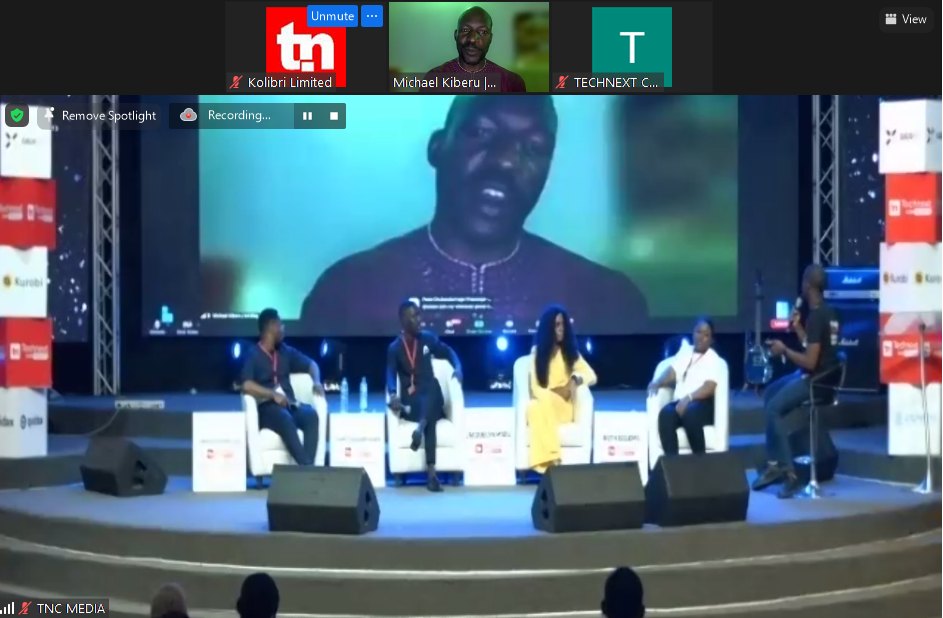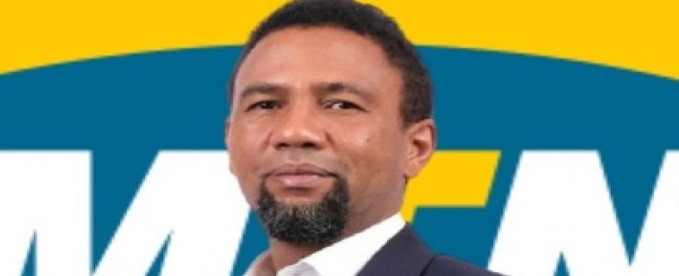Telecom
Technext Rallies Blockchain Stakeholders on the Future of Digital Currencies @ Africa’s Largest Cryptocurrency Gathering in Lagos

Technology news platform, Technext, held the maiden edition of its Technext coinference on Thursday, December 9th at the Pistis Conference Center in Lekki, Lagos.

During a Panel session themed ” Blockchain: Opportunities for Africa” at the event on Thursday, in Lagos.
The event, with the general theme “Reimagining crypto as the future of finance,” gathers brilliant minds in the Nigerian blockchain sector to have essential discussions about the future.
David Afolayan, Content chief at Technext, in his opening address reiterates that it is important to have such a conversation around digital currencies as it is the new approach to trade and central to our survival.
“We need instruments to achieve conveniences, and trade is that instrument. Trade has taken different forms, and now we are lucky to be at the foothold of that change where digital currencies are replacing fiat money and we can transact without borders. ” – Content chief at Technext, David Afolayan,
He also noted that the rules guiding trade many years ago are no longer applicable and many people are not finding that convenient. To address these concerns, innovators, enthusiasts, and regulators need to have a conversation, one that the event provides.
The hybrid event brought together individuals and institutions from across Nigeria and beyond. Stakeholders and individuals from regulatory bodies were also present at the event.
Giving a keynote address at the event, Prince Clem Ikanade Agba, minister of state budget and national planning, stated that the event captures the mutual desire of the government and its citizens to explore innovative methods towards economic recovery, growth, and development.
According to the minister, the government remains enthusiastic about the numerous possibilities the crypto industry provides despite the seemingly growing restrictions.
“So far, I hope I’ve demonstrated that both citizens and governments see the benefits of cryptocurrencies and share a mutual belief in them.
“I believe it is crucial for all stakeholders to view each player as a key teammate in forging a path toward a healthy crypto space in Nigeria. ”
He noted that cryptocurrencies could be the biggest disruptor in finance and governance the world has ever witnessed. However, the government needs to regulate the industry.
Regulations of the industry don’t mean “a giant hammer slamming down on the activities going on in an industry,” but rather to optimize conditions for growth, tailored towards the industry.
The event also had insightful takes from enthusiasts and innovators in the blockchain industry who addressed lingering questions and myths around the sector.
The first panel discussions involved Uzoma Dozie, CEO of Sparkle; Buchi Okoro, CEO of Quidax; Dickson Nsofor, CEO of Korapay; Austin Okere, CEO of CWG; Nkemdili Uwaje, CEO of Future Software; and Chimezie Chuta, Founder of the Blockchain Nigeria User Group.
The session was focused on untying the regulatory knots in the space, and a key idea that was mentioned by all speakers was the pace at which cryptocurrency is changing the financial system.
A panelist, Uzoma Dozie, spoke about the difficulties of scaling crypto because it is currently one of the fastest payment systems in the world.
He reiterated that the Nigerian CBDC, enaira, is not going to compete with card payments. It will only be one of the many available payment systems.
Buchi Okoro, CEO of Quidax, elaborated that the central bank’s development of eNaira is a step towards meeting stakeholders halfway and will encourage digital liquidity.
He explained that in the same way that WhatsApp can’t replace hugs and physical interactions, cryptos can’t replace fiat cash. Both currencies can only collaborate to bring better lives to the people.
Patricia’s CEO, Hanu Fejiro Agbodje, giving the keynote speech on Blockchain for Africa: The endless possibilities illustrate how Michael Faraday did not envisage that one day, Elon Musk would use his creation, electricity, to power his electric vehicles.
According to him, the world is still in its very early days of blockchain technology. It is one that people will constantly try to understand and use in various ways into the unknown future.
“We have been succeeding in this industry with zero support. Imagine if we got support from the government. He concluded by saying, “We can win and we will win as long as we continue to strive,”
The second panel comprised experts like Emmanuel Babalola, Africa Director at Binance and Interim CEO of Bundle; Modibe Matsepena, Senior Associate of Growth in Africa at Paxful; Founder of Aza Pay, Jacqueline Madu, and Bitmama CEO, Ruth Iselema.
Owing to the popular belief that crypto transactions are not traceable, users wanted to know the veracity behind that claim.
Buchi Okoro replied that Bitcoin is not anonymous. Bitcoin is pseudonymous.
“When you track patterns on ether scan and blockchain explorer, you can actually see every transaction that’s happened on the blockchain up until the very first production of that bitcoin,” he says.
Further highlights from the event were the brand moments, where institutions in the crypto scene gave insights into their various innovative products aimed at making the Nigerian blockchain industry a success.
Most of the conversations from the event centred around regulations and what the future holds for the crypto space in Nigeria.
Telecom
PAT Taps Osi as CEO

Pan African Towers (PAT), a Nigerian infrastructure provider serving 9mobile and Spectranet, has appointed Echezona Osi as chief executive officer.

Echezona Osi
Adefolarin Ogunsanya, company’s, board chairman, explained in a statement that Osi would succeed Oladipo Badru, whose tenure lasted nine months in acting CEO position. Osi has more than 28 years of experience in the telecommunications sector across various regions of Africa.
Prior to his appointment as CEO, he had served as the head of network deployment at Airtel Nigeria, operations director and chief technical information officer at MIC Tanzania, chief technology officer roles at IPT PowerTech Nigeria, Rhino Niger Networks and Biswal Nigeria.
He obtained a degree in electrical/ electronic engineering from the University of Benin and a postgraduate diploma in data science and business analytics from the University of Texas.
Telecom
NCC Introduces N10m Licence Fee for Bulk SMS Service

Companies sending bulk international text messages, also known as Application-to-Person (A2P) messages, will now have apply for a licence that costs N10 million.

This is part of new rules introduced by the Nigerian Communications Commission (NCC) aimed at cleaning up the system, fighting fraud, blocking spam messages and stopping money from leaving the country unchecked.
These A2P messages are the kind customers get from banks, online stores, hospitals and political campaigns, automated texts sent from apps to their phones.
According to the commission, the bulk international text message system has been poorly regulated, allowing misuse and invasion of privacy.
“The International SMS Service Ecosystem in Nigeria has not been fully brought under regulatory control. It has been observed that the excessive use of the Short Message Service has led to fraud, spam and illegal activities,” the NCC said.
The regulator warned that without action, the problem would worsen as more people use mobile phones and digital services.
To solve this, the NCC is creating a central platform, or gateway, through which all international bulk text messages must pass through.
The agency said this would help to monitor messages in real time, ensure proper fees are paid, and make sure the money stays in Nigeria where it can contribute to the economy.
As part of the incoming change, service providers must follow strict rules, including strong data protection, spam filters, and message encryption.
Also, they must also work with local mobile networks and make sure all messages come from a verified sender
The NCC warned that any message without a proper sender ID will be blocked and not delivered to users.
To protect users from unwanted texts, the new rules say companies must get clear permission before sending any promotional content.
The rule also says people must also be able to choose whether they want to receive such messages or not.
Companies are now required to keep records of all messages for at least six months and must clearly state all charges involved.
The NCC said fees for help requests, cancellations, or service info must be transparent and not include hidden charges.
The commission will issue licences to several providers to encourage healthy competition but may limit new licences if needed.
Only companies that show they can stop fraud and safely deliver messages will be allowed to operate. They must also regularly report their message traffic and finances to the NCC.
It warned that any company that breaks the rules risks getting fined, suspended, or having its licence revoked.
Offences like charging illegal tariffs, ignoring security rules, or avoiding taxes will be punished, the NCC said.
The commission added that the new rules follow the Nigerian Data Protection Act 2023 and support the federal government’s goal of strengthening cybersecurity and controlling Nigeria’s digital space.
The framework will also be reviewed from time to time to keep up with new technology and market trends.
Telecom
MTN Nigeria Targets $1Bn Cloud Market with Largest Modular Data Centre

MTN Nigeria has launched what it claims is the country’s largest prefabricated modular data centre, marking a bold push into the country’s fast-growing cloud market and taking aim at global giants such as Amazon Web Services, Microsoft Azure and Google Cloud.

Karl Toriola, CEO, MTN Nigeria.
The shift comes as demand for cloud services in Nigeria soars — driven by the uptake of mobile apps, fintech tools and e-learning platforms — while foreign providers have become costlier in the wake of the naira’s sharp devaluation.
“This is one of the biggest data centres in West Africa and probably one of the biggest in Africa,” said Karl Toriola, CEO, MTN Nigeria.
He described the new Tier III-certified facility, with locally hosted cloud services, as “transformative for the technology ecosystem in Nigeria and very supportive of the federal government’s agenda”.
MTN Nigeria, the country’s largest telecoms provider, has so far invested $120m in the first phase, delivering an IT load of 4.5MW. A second phase, set to double capacity to 9MW, is budgeted at $135m.
“We already have data centres that are running our existing capacities,” Toriola said.
“We will go to 9MW in short order, possibly 14MW, and we can expand even further.”
He said the facility would allow local hosting for tech developers, large enterprises including banks and oil companies, and government agencies — markets long dominated by foreign cloud providers.
“Multinational companies such as Netflix, Facebook and Instagram can also host a lot of their data here. That improves the quality of service and reduces the cost of storage,” he added.

 Broadcasting2 days ago
Broadcasting2 days agoNigeria Week Ahead: Inflation, Oil and Naira in focus

 News2 days ago
News2 days agoEFCC: Accusations Against Our Chairman Are Baseless and Misleading

 Telecom24 hours ago
Telecom24 hours agoMTN Nigeria Targets $1Bn Cloud Market with Largest Modular Data Centre

 Telecom24 hours ago
Telecom24 hours agoNCC Introduces N10m Licence Fee for Bulk SMS Service

 E-Business24 hours ago
E-Business24 hours agoFirm Highlights Top Risks of Quantum Computing

 General News24 hours ago
General News24 hours agoAM Best Reaffirms Stable Outlook for Cyber Insurance Market

 General News24 hours ago
General News24 hours agoBurna Boy Distances Himself from Meme Coin, Labels Crypto as Fraud

 Telecom24 hours ago
Telecom24 hours agoPAT Taps Osi as CEO





















